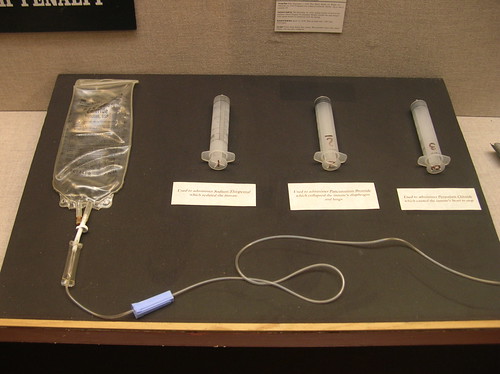 |
| Chemicals used for lethal injection Photo courtesy of Jessica Stacey. |
According to court documents, Mr. Morales and another man killed Terri Winchell,
the men lured Winchell into a car, where defendant attempted to strangle her with his belt until it broke, beat her repeatedly on the head with a hammer until she was unconscious or dead, dragged her body into a field and completed an act of sexual intercourse, and finally stabbed her four times in the chest to assure her death.Similarly, "Albert Brown was found guilty by a jury of forcible rape and first-degree murder in the death of 15-year-old Susan J." Both defendants were sentenced to death. They appealed their convictions all the way through state courts to the U.S. Supreme Court and lost. The filed writs of habeas corpus, which were unsuccessful, again all the way through the U.S. Supreme Court. Then, in 2005, they filed another lawsuit in state and federal court claiming that the death penalty procedure was unconstitutionally painful which is the subject of the current lawsuit.
Judge Jeremy Fogel denied the challenge and the petitioners appealed to the Ninth Circuit. In light of the Supreme Court's decision in Baez v. Rees, the Ninth Circuit ordered Judge Fogel to review the California Department of Corrections and Rehabilitation's death penalty procedures to see if they passed constitutional muster. As noted in the order included below the fold, the California procedures appear to have many more protections than the one's Kentucky used in Baez. Nonetheless, the executions are stayed until Judge Fogel is able to receive briefing on them.
These appeals have incurred incredible cost. There is nothing more expensive in the legal system than the attorney costs associated with the numerous appeals in death penalty cases. The Los Angeles Times conducted a study in 2005 stating that the attorney fees involved in an execution typically cost $250M. The California Commission on the Fair Administration of Justice has a study which puts the figure around $232.7M. The ACLU of Northern California argues that California spends $114M per year arguing death penalty appeals. The Heritage Foundation cites studies which show each execution deters three other murders to argue for the justification of this expense.
Morales v. Cate
No comments:
Post a Comment